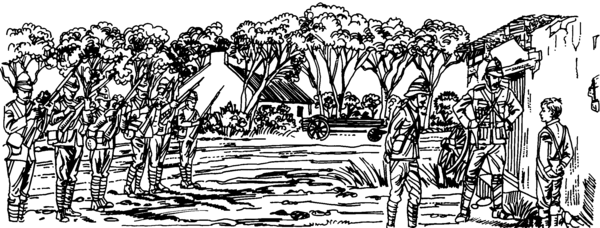| << Chapter < Page | Chapter >> Page > |
That night in April a small group of burghers had slept at Smaldeel, but they had to take to their heels early in the morning when they noticed a division of English soldiers approaching. There were anxious moments while it seemed that the English might catch up, but then the Boers swerved into an overgrown kloof and disappeared.
“Ha! Fooled you!” Japie laughed to himself. He had been watching the pursuit from behind the house, but now entered the house to put on water for coffee for his mother.
Not long after the sound of approaching horses was heard. Japie peeked through the door. Yes, the English had come up to the house. And their leader seemed to be furious. Angry, of course, because the Boers had evaded him with such ease. Japie Greyling laughed again, but quietly.
The English captain approached with long strides. Everything was going against him this morning and he had run out of patience. He knew that a Boer commando was operating in the area and he wanted to get at them. The captain noticed the boy and smiled. It shouldn't be too difficult to get the information that he needed from the youth.
He beckoned to his interpreter and commanded: “Ask the child where the Boers who rode off from here went.”
“To their commando,” Japie answered readily.
The captain's expression darkened. “That I know!" he retorted roughly.
“Where is the commando?”
Japie looked him straight in the eyes. “That I'm not telling,” came his reply.
“Cocky, isn't he now?” muttered the captain. “I'll pull his tail feathers for him!”
His large hand closed over the boy's shoulder and he dragged him across the farmyard. By a narrow strip of wall between two doors of an outbuilding he forced the child's slight frame against the wall.
“Where are the Boers?” he asked again. No interpreter was required. The boy knew what the Englishman wanted. And the captain? Perhaps he already knew the boy's answer.
“I'm not telling!”
The captain barked a command, and the sergeant reported it to his men. Six soldiers stepped up, dropped to the ground on one knee, rifles cocked, their fingers on the triggers. The boy could have no doubts about the intentions of the English. Inside the kitchen, a woman's voice was raised in a pitiful moan. Somewhere outside a horse snorted and stamped the ground impatiently. Everything else was suspended in stillness.
Then the captain waved away the rifles, his men lowered their weapons and he walked over to the boy. “You are a brave boy,” he said, grasping his hand. “I hope to meet you again one day!”
The English mounted their horses and rode off, and the mother burst through the door to hug her son to her. But Japie shrugged her off, watching the disappearing English soldiers, a hint of disappointment on his face, like when a child is denied something lovely that has been promised.

This and many other heroic tales from the history of the wars fought in our country can be read in Heldeverhale a book by P.W. Grobbelaar and others.
STATISTICS
22 000 British troops in SA before the war.
450 000 British troops in SA by the end of the war.
35 000 burghers between 16 and 60 years of age on commando.
2 000 foreign volunteers on the side of the Boers.
16 years of age
22 074 girls and boys under 16 12 000 burghers on commando by the end of the war.
30 000 farmhouses burnt down.
R404 000 000 (£202 000 000) - the cost of the war to Britain.
43 000 Non-Whites in concentration camps in May 1901.
118 000 Whites in concentration camps in May 1901
LOSS
British empire
6 000 soldiers fallen in battle
16 000 dead due to illness and accidents
400 000 horses and mules on the battlefield dead due to illness and accidents.
Free State and Transvaal
110 000 horses and mules on the battlefield died due to illness and accidents
3 990 burghers on commando fallen in battle
1 081 burghers on commando dead due to illness and accidents
1 118 burghers died as prisoners of war in camps on islands
27 927 people died in concentration camps, of which
1 676 men over 16 years of age
4 177 women over years of age
7 000 – 12 000 Black people have died in camps due to hunger and disease
| LU 3.3 | ||
| LO 3.3 |
Sources:
A. Boëseken: Die Nuusbode
P.W. Grobbelaar, e.a.: Heldeverhale
D. Sleigh: Ruiters teen die Ryk
M.C.E. van Schoor: Spotprente van die Anglo-Boereoorlog, Tafelberg-uitgewers
| Assessment standards(ASe) |
| LEARNING OUTCOME 1: HISTORICAL ENQUIRY- The learner will be able to use enquiry skills to investigate the past and present |
| 1.1 Access the sources |
| 1.2 Use the sources |
| 1.3 Communicate information from sources (reporting)) |
| LEARNING OUTCOME 2: HISTORICAL KNOWLEDGE AND UNDERSTANDING – The learner will be able to demonstrate historical knowledge and understanding |
| 2.1 Understand chronology and time |
| 2.2 Supply reasons why an historical event took place (causes, effects) |
| 2.3 Differentiate between different periods (similarities, differences) |
| LEARNING OUTCOME 3: INTERPRETING HISTORY – The learner will be able to interpret aspects of history |
| 3.1 Be aware of more than one view of the past |
| 3.2 Distinguish between fact and opinion |
| 3.3 Reconstruct the past |

Notification Switch
Would you like to follow the 'History grade 7' conversation and receive update notifications?